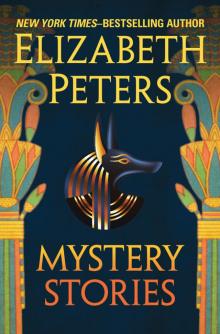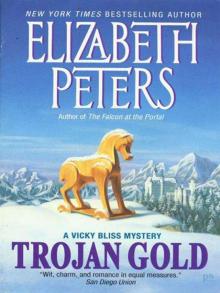- Home
- Elizabeth Peters
Laughter of Dead Kings vbm-6 Page 4
Laughter of Dead Kings vbm-6 Read online
Page 4
“Enjoy yourself,” Schmidt said, standing on tiptoe so he could pat me on the head. “You are not looking your best, Vicky. You need a rest.”
So I wasn’t looking my best, was I? Compared to whom? I sulked out and located Karl the janitor, who had a crush on Caesar, and who was thrilled at the prospect of looking after him while I was gone. Schmidt was not particularly thrilled at the prospect of dropping by my house daily to check on Clara, but I knew I could count on him to do it when he remarked, “Suzi will be glad to help. She is very fond of cats.”
So Suzi was going to be around for a while. I hadn’t noticed any bonding going on between Suzi and Clara. In fact, Clara had made rather a point of trying to climb onto Suzi’s lap, which, as any cat person knows, is intended to be annoying rather than affectionate. A nasty new suspicion slid into my nasty suspicious mind. I didn’t say anything to Schmidt—what would have been the point—but I raced home and spent a frantic hour going through files and drawers to make sure I hadn’t left anything incriminating lying around. Since I wasn’t sure what might be incriminating, it was a somewhat futile procedure. When I mentioned my worries to John, he shrugged.
“There is no way one can defend oneself from a difficulty which is undefined and may not even exist. And don’t mention Suzi to Feisal. It hasn’t occurred to him to ask who Schmidt’s ladylove is, and I’d just as soon he remained ignorant.”
“I wish I were,” I grumbled. “What do you suppose she’s after?”
“Schmidt, perhaps.” He turned back to the computer. I slammed the drawer I had been searching.
“You aren’t leaving any incriminating e-mails on that thing, are you?”
“What do you take me for? Finish packing. We haven’t much time.”
Packing was another undefined difficulty, since I didn’t know how long I’d be gone or where I was going. John and I were planning to catch the first available flight to London after we got Feisal on his way; but after London, who knew where the quest would take us?
Probably someplace I didn’t want to go.
I made a final call to the museum, to leave last-minute instructions with my new secretary: “Don’t call me, I’ll call you, and if you give my number to someone who doesn’t already have it I will Take Steps.” Gerda, my former nemesis, had left to get married; I wondered if she was reading her new hubbie’s mail the way she had pried into mine. Her replacement didn’t open my mail, but his inhuman efficiency was almost as irritating. I had a feeling he thought he could do my job better than I did and was out to prove it. (I wasn’t worried; Schmidt likes me best.)
We made it to MUC with no time to spare and escorted Feisal to Hall C for his EgyptAir flight. Instead of proceeding through security, he stood shuffling his feet and shifting his briefcase from hand to hand.
“There’s something I have to tell you.”
John groaned. “Worse than what you’ve already told us?”
“No. I hope not. I mean…” His long lashes fell, and his high cheekbones turned a shade darker. “I’m in love.”
“Oh,” I said blankly. “Who—”
“For God’s sake!” John’s voice rose over mine. “What—”
“It’s not just my job I stand to lose.” Feisal grabbed my hand and squeezed it. “I’ll lose her too, if I’m disgraced and discredited. You understand, Vicky. You won’t let me down, will you?”
His big soulful brown eyes would have melted the heart of a dried-up mummy. “Of course not,” I said, squeezing back. “Who—”
“Stop that,” John said through his teeth. “Get going, Feisal, or you’ll miss your flight.”
“If she loves him she’ll stick by him whatever happens,” I said, as we watched Feisal proceed on his way.
“Is that a promise?” John inquired.
I decided to ignore that one. “I wonder who—”
“Does it matter?” John took my arm. “We needn’t be at our gate for another hour or so; I’ll buy you a coffee.”
British Air leaves from a different hall in the same terminal. John and I hadn’t been able to get adjoining seats, and since I hadn’t brought anything to read I made him stop at a bookstall, despite his sneers about lowbrow literature.
“I suppose you always travel with a copy of Plato in the original Greek,” I countered, browsing the racks of magazines and newspapers. The latest issue of Der Stern caught my eye. “Hey,” I said, picking it up. “Isn’t that Dr. Khifaya on the cover?”
“So it is. Wonder what he’s done to make the cover of Der Stern?”
He had been photographed at Giza, leaning casually against a column, with a couple of pyramids in the background. He bore a certain resemblance to Feisal—the same strong features and thick black hair and tall athletic body, the latter set off by neatly creased khakis and a matching jacket covered with pockets, the kind worn by photographers and a few archaeologists, and tourists trying to look like one of either group. Dr. Ashraf Khifaya, the secretary general of the Supreme Council of Antiquities, didn’t have to try. Though remarkably young for that high post, which he had held for less than a year, he had excavated at practically every site in Egypt.
“The usual,” I said. “Asking for Nefertiti back. He’s been picketing the Altes Museum in Berlin off and on for weeks, but this time he says he’s going to bring along a few friends. I wonder what…”
I paid for the magazine and went on reading, guided by John’s hand on my elbow. Most of the material was familiar. German and Egyptian scholars had been arguing about the beautiful bust of Nefertiti ever since it went on exhibit in Berlin back in the 1920s. The Egyptians had a point. Some of the other antiquities they wanted back, like the Rosetta Stone, had been found and appropriated before the foundation of the Egyptian Antiquities Organization, as it was once called. By 1912, when Nefertiti had turned up in a German dig, the laws governing the division of finds were strict: the Egyptians kept pretty much whatever they pleased, especially unique items, and the rest was divided between the Cairo Museum and the excavators. Somehow or other, Nefertiti had been included in the objects handed over to the excavators. It was hard to understand how anyone, even an inexperienced inspector, could have failed to claim her. Like Tutankhamon, the life-sized painted bust is unique, and unlike poor old Tut, it is outstandingly beautiful.
John steered me into a chair; when he returned with two cups of coffee I had finished the article.
“I wonder if he’ll really do it,” I said.
“Bring a brass band and some dancing girls to help him picket the museum?” John chuckled. “I hope so.”
“Wouldn’t the cops run him in?”
“He’d love that. Excellent publicity.”
“I’m surprised you never tried to steal her,” I said.
“Nefertiti?” John looked pensive. “I might have had a stab at it if anyone had offered me enough. I didn’t steal things for myself, you know,” he added self-righteously.
“The important word in that sentence is not ‘myself,’ but ‘steal,’” I pointed out, and closed the magazine. “He is a good-looking guy, isn’t he? Is it only a coincidence that this—um—business happened soon after he took over? Speaking of people who have made enemies—”
“We weren’t.”
“Then let’s. I trust you didn’t point out to Feisal that there is a certain multimillionaire who might hold a grudge against him. He was instrumental in foiling Blenkiron’s plan to steal Tetisheri’s tomb paintings. And if we’re talking about collectors with bizarre tastes—”
“Blenkiron’s name does come to mind,” John agreed. “Though the word exotic is more accurate than bizarre. The paintings were beautiful. Tut isn’t. Anyhow, you and I and Schmidt did our share of the foiling.”
“Is that supposed to be a happy thought?”
“I can’t believe Blenkiron is responsible for this. He collects art objects, not curiosities, and if he were the sort of man to hold a grudge, he wouldn’t focus on Feisal. However, you have raised a poi
nt I hadn’t considered—the timing. What do you know about Khifaya’s background?”
“Not much,” I admitted. “When I spoke of making enemies, I was thinking about his position rather than his personal history. His predecessor made a huge point of demanding that foreign museums and collectors return Egypt’s stolen antiquities, and Khifaya seems to be intent on carrying on the good work.”
“‘Stolen’ isn’t strictly accurate in some cases,” John said. “The Rosetta Stone—”
“I know more than I need to know about the Rosetta Stone. But you, of all people, can’t deny that a number of museums and private collectors have objects whose provenance is dubious.”
“I take leave to resent that implication,” John said primly. “Why do you keep wandering off the subject? All I said was that Khifaya’s background might bear investigation.”
“A nasty divorce? Hey, is he married?”
“Don’t be frivolous.” John glanced at his watch and rose. “Let’s go.”
“It’s a good picture. If we go to Egypt, maybe I can get him to autograph it. ‘To dear Vicky, my biggest fan.’”
John’s lip curled in one of his elegant sneers.
“He’s even handsomer than Feisal. Or,” I said, struck by a new and inspiring thought, “maybe he’ll let me be one of his friends next time he pickets the museum.”
Content to be towed by a masterful hand on my arm (so I could go on admiring the picture of my new crush), I didn’t take note of where we were going until we arrived at the gate.
“Hey,” I said, digging in my heels. “This is the wrong flight. It’s not going to London.”
“Neither are we.” He had timed it perfectly; the last passengers were lined up. He handed over our boarding passes and propelled me forward.
“Why are we going to Rome? When did you change plans? Why didn’t you tell me?”
“I didn’t change plans.”
“But you told Feisal—”
“No, I didn’t.”
“Yes, you…” Now that I thought back on his reference to London, he hadn’t actually said we were going there. “Damn it, I don’t want to go to Rome. Please don’t tell me you mean to confer with Pietro and whatsername and the other crooks you were working with when we first met.”
“All in the past, my dear, the distant past. In point of fact I hope to confer with someone at the Vatican. Here’s your seat.”
He went on to find his, leaving me in a frenzy of speculation. Someone at the Vatican. Not the pope. Surely not the pope. Not John.
I had ample time for reflection during the flight. Unfortunately, all I could do was go over and over the same ground, like a cat chasing its tail, getting nowhere. Not one cat, several of them, a random feline ballet, interwoven and endless. Suzi. Rome. Tutankhamon. Why in heaven’s name would anybody steal Tutankhamon? Why would anybody want to steal it…him? What would you do with him once you had him? You couldn’t stick him away in an attic or a closet, he’d require…What does a mummy require? Controlled temperature, sterile atmosphere, room service?
I jerked awake from a dream that featured an air-conditioned suite in the best hotel in Cairo, and Tutankhamon laid out on a Posturepedic mattress surrounded by harem beauties in white nurses’ uniforms.
I had planned to intercept John when he passed my seat, but everybody was pushing and shoving and I didn’t catch up with him until I reached the baggage area.
“Not the pope,” I said.
“I beg your pardon?” He raised one eyebrow, in that maddening way of his.
“All right, not the pope. Who? And if you say ‘Who what?’ I will lie down on the floor and kick and scream.”
“Not here, someone will trample you underfoot.” He turned and ran a seemingly casual eye over the passengers who were shoving and pushing as they waited for the belt to deliver their luggage. Nothing unusual about them that I could see: the young mother shepherding two darling kiddies who were beating at each other with stuffed bunnies; the self-important business types yelling into their cell phones; two priests in black cassocks; a pair of twenty-somethings, nationality indeterminate, wound round each other like pretzels; a little gray-haired lady wearing sunglasses and carrying an enormous purse…Nobody brandishing an UZI or a deadly vial of shampoo.
“Nobody could have followed us onto that plane,” I declared. “I didn’t even know we were taking it.”
“Precisely.”
B y the time we got through passport and customs it was late evening and I was starved. I informed John of this.
He didn’t even respond with a raised eyebrow. Taking me by the arm, he hustled me out of the airport, past a line of waiting taxis. Pausing by an anonymous dark sedan, he opened the back door, shoved me in, and followed me.
“What—” I began.
“Quiet,” said my beloved. Leaning forward, he pressed a knuckle into the back of the driver’s neck.
“Albatross,” he said.
“Ancient mariner,” replied the driver, and giggled. The car pulled smoothly away from the curb.
“Oh, for God’s sake,” I said. “How paranoid can you get?”
“Just because you’re paranoid doesn’t mean—”
“I am familiar with the reference.”
“This is Enrico.”
“How do you know?” The man was as anonymous as the vehicle. He wore one of those chauffeur-type peaked caps, which would have made it difficult to see his face even if it hadn’t been dark and he hadn’t been looking forward.
“I’d know that giggle anywhere,” said John.
Enrico obligingly produced another giggle and a polite “Buona sera, signorina.”
John turned to look out the back window. Apparently he was satisfied by what he saw, or didn’t see; after a while he returned his attention to me.
“You may now finish your question,” he said graciously.
I refused to give him the satisfaction of asking the obvious. Obviously he had set this up before we left Munich, at the same time he had changed our reservations. Obviously the driver was one of his old acquaintances. Obviously he was deathly afraid of being followed, which meant—obviously—that he had reason to suspect he would be followed.
“Never mind,” I muttered.
A chilly silence ensued. At least it was silent in the backseat. Enrico began crooning in an off-key falsetto. It took me a while to recognize the tune: one of Cherubino’s arias from The Marriage of Figaro. I joined in, hoping to annoy John. He is an excellent musician with well-nigh perfect pitch, which cannot be said of me. Except for twitching a bit when Enrico and I tried for a high note and missed, he did not react. Enrico told me I had a beautiful voice. We sang more Mozart, all the way into Rome, at which point I looked out the side window and tried to figure out where we were going, since I was damned if I was going to ask John.
The narrow streets of Trastevere gave me the clue. When we stopped in front of a small hotel I said, “Well, well, here we are again. I’m surprised the cops haven’t closed this place down. If you are representative of its customary clientele—”
“Shut up and get out,” John snarled.
It hadn’t changed a bit. The same quiet, rather elegant lobby, the same creaky lift, and, of course, the same room. The same heavy off-white drapes, the same cozy little sitting area, with a red plush love seat and low table, the same bathroom. The same bed.
“You didn’t even let me say good night to Enrico,” I said, seating myself on the red plush and crossing my legs.
John tossed his suitcase onto the bed and began unpacking.
“I’m hungry,” I said.
John stiffened, gave me a piercing look, and then relaxed. “You’re always hungry. Call room service. You remember the procedure, I trust?”
That and a lot of other things, I thought, as I picked up the phone. John had brought me here after the end of our Roman escapade—if I may use such a light-hearted word to describe a scenario that included murder, attempted murder (of me
), grand theft, fraud, another murder, attempted seduction (of me), and a spectacular nervous breakdown (not me). The hotel didn’t have a restaurant; if a guest wanted anything, from a gourmet meal to a piano, he called the front desk and asked for it—and got it. On the occasion of my first stay I had requested medical supplies and copious quantities of booze, in addition to food. The booze was for me. My nerves were in terrible shape. The medical supplies were for John, who had incurred a number of well-deserved injuries. He’d been one of the gang initially and had come over to my side only because…Well, to make a long story short, by the time we left the hotel next day I was inclined to believe he had repented of his evil deeds and learned to care deeply for me. At least I believed it until the next time we met…
With a sigh, I picked up the phone. “What do you want to eat?” I asked.
“Give it to me.” John took the telephone. “You don’t know anything about wine.”
“I know I want lots of it.”
The wine arrived almost at once. It was red. The waiter slithered silently out; John sat down next to me and raised his glass. “Cheers.”
“Is it the pope?”
“I knew you were going to say that,” John remarked with satisfaction. “That’s one of the reasons why I love you. Your bull-headed one-track mind. No, dear, it isn’t His Holiness. I don’t move in such exalted circles.”
“Shouldn’t you check to see whether Feisal has called?” I held out my empty glass.
“And I love the way you leap from one non sequitur to another. He’s barely had time to reach Cairo. Anything from Schmidt?”
I hadn’t bothered to turn my cell phone on after we landed, since I didn’t particularly want to hear from anybody, especially Schmidt. When I did so, I found not one but three text messages from him. Schmidt adores texting. He adores every new gadget until the next one comes along.

 Mystery Stories
Mystery Stories A River in the Sky
A River in the Sky He Shall Thunder in the Sky taps-12
He Shall Thunder in the Sky taps-12 Laughter of Dead Kings vbm-6
Laughter of Dead Kings vbm-6 Silhouette in Scarlet vbm-3
Silhouette in Scarlet vbm-3 Night Train to Memphis vbm-5
Night Train to Memphis vbm-5 Borrower of the Night vbm-1
Borrower of the Night vbm-1 The Golden One
The Golden One Trojan Gold vbm-4
Trojan Gold vbm-4 Crocodile On The Sandbank
Crocodile On The Sandbank